Communications Community Office 2022-2023 Annual Report

Land acknowledgement
In the spirit of reconciliation, we acknowledge that the Communications Community Office is located on the traditional unceded territory of the Algonquin and Anishinaabe people. We pay our respects to their elders, past, present, and emerging.
What we do
The Communications Community Office (CCO) is a horizontal organization that supports communications professionals across the Government of Canada. We help communicators enhance their skills and abilities and grow their careers by offering a variety of services, including learning events, communications tools and news, staffing processes, and networking opportunities.
The CCO also serves as the secretariat for monthly heads of Communications meetings and the annual Heads of Communications Retreat. The speed of communications is evolving due to the rapid changes in technology. That is why we work closely with departments, central agencies, communities of practice, and other functional communities, as well as with public and private sector partners to get ahead of the trends and develop the skills needed to keep pace with the speed of communications.
Mandate
Our mandate is to provide tools and mechanisms to:
- support recruitment and retention efforts by managers;
- enhance learning and career development opportunities for communicators;
- support the use of new technology and new media;
- strengthen the community through the sharing of information and networking; and
- play an advocacy role in positioning the communications function as one that adds value in order to advance the Government of Canada’s priorities.
Objective
Our objective is to support and build a communications community that:
- is widely recognized as high performing;
- works collaboratively with partners;
- has the right skill sets; and
- attracts top talent.
Areas of focus
- Information sharing and data analysis
- Training and learning
- Recruitment and retention
- Community development and recognition
- Career development.
Message from the Communications Community Champion
I am pleased to present the 2022-23 annual report of the Government of Canada’s Communications Community Office (CCO). This report celebrates and reflects the capacity building, engagement and support provided to our communications community throughout the past year.
I wish to express my sincere appreciation to all communications professionals across the Government of Canada for their unwavering passion and determination to communicate, engage, and create meaningful connections with all Canadians. I am inspired by the communications community and look forward to the work to come.
It is a privilege to serve as the champion under the Communications Community Office’s (CCO) guidance. This year, we have witnessed the special ability of communicators to build connections and trust with Canadians, stakeholders, other levels of government, and the public service as a whole. This has become increasingly important during these times of mis- and disinformation and other impeding challenges.
A critical element of this trust is acknowledging and addressing the long-standing discrimination and racism that many Indigenous, Black and racialized public servants experience.
The federal public service is stronger and most effective when our voices and experiences reflect the diversity of Canada’s populations. This year, the CCO launched the Career Development Initiative for Indigenous, Black, and Racialized Communicators (CDI) (accessible only on the Government of Canada network), an ambitious initiative in response to the Clerk’s Call to Action on Anti-Racism, Equity and Inclusion in the Federal Public Service.
I invite you to take full advantage of the opportunities the CCO continues to offer as we evolve towards a more equitable and inclusive professional practice of communications. Investing in your own professional development and networking are an important contribution you can make to our collective success.
Wishing you a rewarding year ahead and Wela’lioq,
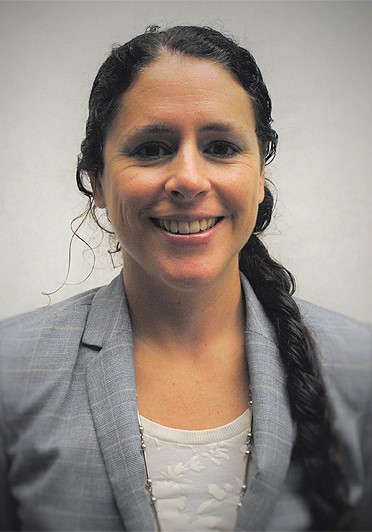
Valerie Gideon
Associate Deputy Minister of Indigenous Services and President of FedNor
Champion of the Communications Community
Message from the Co-Chairs of the CCO Steering Committee
When we reflect on the years gone by, it is astonishing to see the changes that have occurred in such a short time. It is a testament to the adaptability we see throughout the communications community.
The most obvious change is the rapid evolution that resulted from the global COVID-19 health crisis. Once again, this year, we drew important conclusions from the challenges and opportunities the pandemic presented to all government communicators. Additionally, the evolving technological sphere has profoundly changed our environment.
Together, these forces have loudly reasserted two key lessons.
The first of which is this: it is not enough to simply inform. We need to build confidence and create understanding. It is crucial we do this when disinformation inundates us with confusing and conflicting messages.
The second is the importance of evidence-based communications: if we are to successfully change attitudes, behaviours, and actions, we must have our facts straight, know our audiences, understand how facts affect them, and involve them in the solutions. We must reach them where they are.
The CCO is a key resource in supporting communicators in these areas. It provides information on emerging trends as well as guidance and support in career development and employee recruitment and retention.
It is also a key player in training the next generation of government communicators, ensuring they make the most of this ever-changing environment and preparing them to lead in an evolving environment.
The CCO takes this role seriously, exploring new tools, new ideas, and new approaches to communicating with Canadians. Highlights from this year include the following:
- Increasing communications skillsets by using behavioural science to develop evidence-backed strategies in partnership with the Privy Council Office’s Impact and Innovation Unit.
- Working to ensure a more diverse and inclusive public communications community. The CCO engaged over 300 Indigenous, Black and Racialized employees through the Career Development Initiative for Indigenous, Black, and Racialized Communicators (CDI).
- Increasing mobility and consistency for communications professionals by developing interdepartmental standardized job descriptions (ISJDs).
- Bringing in new communications talent by qualifying close to 200 candidates through an IS-04 staffing process. Forty percent of the candidates were from outside the federal public service, enabling hiring managers to increase the diversity of their teams.
- Successfully developing and launching, by popular demand, the Communications 101 bootcamp for Canadian public servants on Apolitical.co, a global learning platform.
We thank all our communications colleagues across the government for all that they do. We also wish to thank our steering committee of senior leadership. The dedication and passion for communications never ceases, and we thank all those who have contributed, participated, and volunteered through the communications community. Together, our community is strong, resilient, equipped, nimble, innovative, and dedicated to delivering for Canadians.

Laurie-Anne Kempton
Assistant Secretary to the Cabinet
Communications and Consultations
Privy Council Office
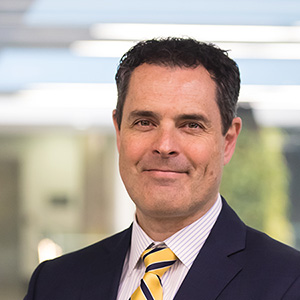
James Stott
Assistant Secretary
Strategic Communications and Ministerial Affairs
Treasury Board of Canada Secretariat
Governance
The CCO’s Steering Committee, made up of directors, directors general (DGs) and assistant deputy ministers (ADMs) of Communications, provides direction and helps us set priorities. Members come from large, medium and small organizations, with at least one representative from the regions.
The CCO participates in meetings with the Privy Council Office (PCO) and heads of Communications to remain in touch with the top issues facing the community and to obtain quick feedback from directors general on initiatives, plans and priorities.
We also consult regularly with executives, managers, and individual practitioners to ensure our services are aligned with the needs of the community.
In many ways, the CCO is a sum of the various parts that make up our community. We often rely on the efforts of volunteers to deliver our services. Community members regularly share knowledge with their colleagues at our learning events, write articles for the CCO Newsletter, and suggest stories, tools and research to share.
Steering Committee members

Laurie-Anne Kempton
Assistant Secretary to the Cabinet
Communications and Consultations
Privy Council Office

James Stott
Assistant Secretary
Strategic Communications and Ministerial Affairs
Treasury Board of Canada Secretariat

Catherine Allison
Director General
Public Education and Vaccine Communications
Health Canada

Mary Dila
Assistant Deputy Minister
Public Affairs
Agriculture and Agri-Food Canada

Kevin Dubé
Director General Communications
Atlantic Canada Opportunities Agency

Jane Hazel
Vice President
Communications and Public Affairs
Canadian Food Inspection Agency

Stéphane Levesque
Assistant Deputy Minister
Public Affairs
Global Affairs Canada
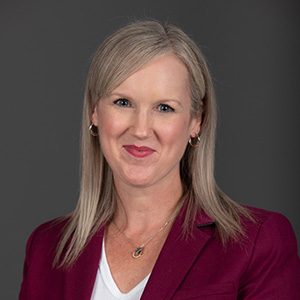
Leanne Maidment
Director General
Communications
Public Safety Canada

Dawolu Saul
Director General
Communications
Veterans Affairs Canada

Fiona Nelson
Executive Director
Communications Community Office
Privy Council Office
We would like to say a very special thank-you to the following people who have all contributed significantly to the CCO and the communications community this past year:
- former Assistant Secretary to the Cabinet and CCO Steering Committee Co-Chair Ken MacKillop, for his role while at the Privy Council Office;
- Caroline Hilt from Canada Economic Development for Quebec Regions; and
- Aruna Sadana from Indigenous Services Canada.
Our partners
The CCO is supported by memoranda of understanding and financial contributions from communications branches in departments and agencies across the Government of Canada. This funding model enables the CCO to offer a variety of services to the communications community. The CCO’s activities support communicators’ learning, training, and career development.
The CCO is also supported by in-kind contributions from many community partners who have provided their support, expertise, and advice throughout the year.
Most notable, these community partners include:
- CCO volunteers,
- heads of communications,
- communities of practice,
- ambassadors,
- the Cross-Canada Advisory Group,
- functional community partners, and
- the Canada School of Public Service.
Communities of practice
Communities of practice (COPs) are grassroots initiatives driven by federal communicators with expertise and a passion in a particular realm of communications. Their community-led structure offers their members the opportunity to share information, best practices, tools, and resources; discuss common challenges; and develop new approaches.
Every year, the CCO has a special role in supporting learning and networking opportunities offered by several of the COPs, including the newly formed Equity, Diversity, and Inclusion Communications Network; Informational Marketing Working Group; Ministerial Communications; and Publications.
List of Communications COPs (accessible only on the Government of Canada network)
- Accessible Communications
- Advertising
- CCO Ambassadors
- Communicating Science Network
- Communications Evaluations
- Copyright Media Clearance Program’s User Group
- Digital Analytics
- Equity, Diversity and Inclusion Communications Network
- Events
- Government Emergency Communicators Network
- Indigenous Communications Subgroup
- Informational Marketing Working Group
- InterComm
- Media Relations
- Ministerial Communications
- Plain Language
- Policy Community
- Public Engagement
- Public Opinion Research
- Publications
- Creative Services
- Social Media
- Speechwriting
- Storytelling
- Web Community / Canada.ca
Accomplishments for 2022-23
Career development
The CCO launched the 2022-23 Mentoring Series in September 2022. In 2022-23, over 380 communicators from across the country participated in the mentoring series, combining for over 240 matches. Since 2018, participation has increased five-fold. Previous survey analysis indicated the need for further tailored matching for equity-deserving groups. Therefore, the CCO included an optional section allowing participants to self-identify regarding gender, disability, visible minority group status, as well as LGBTQ2IA+ community membership.
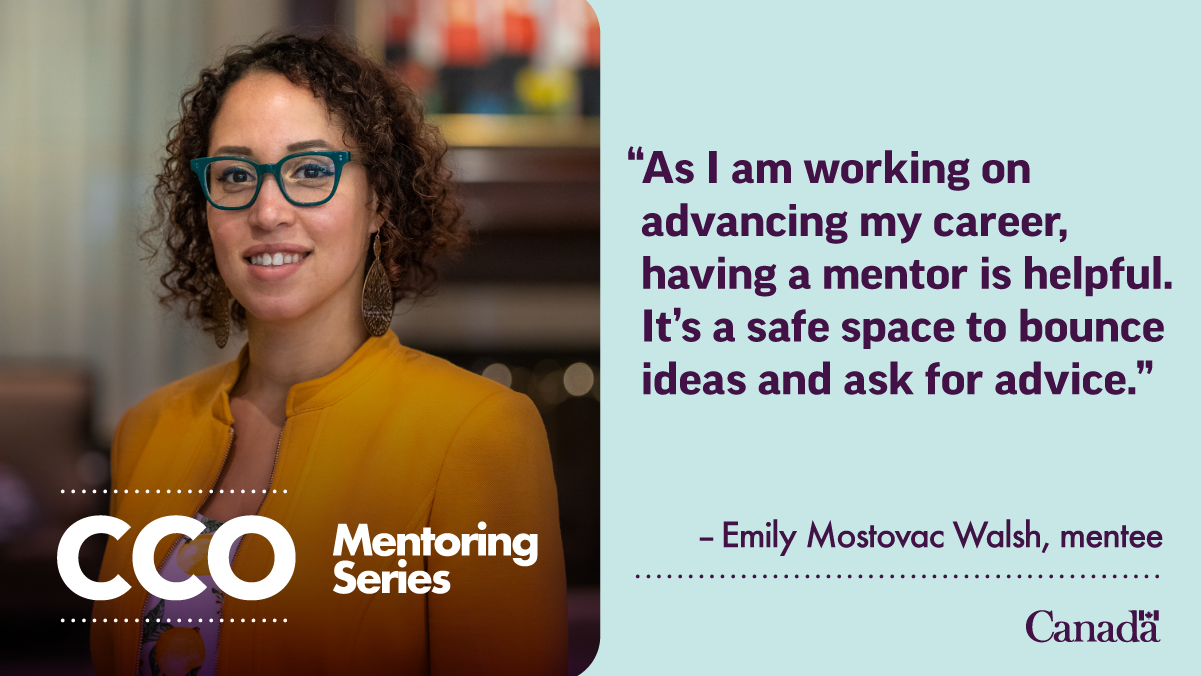
"As I am working on advancing my career, having a mentor is helpful. It’s a safe space to bounce ideas and ask for advice."
Career development initiative for Indigenous, Black, and Racialized communicators
Guided by the Clerk’s Call to Action, the CCO is leading a Career Development Initiative (CDI) to augment representation and enhance areas of expertise and skillsets for Indigenous, Black and Racialized (IBR) communicators. The CDI will focus on the recruitment and career development of employees who identify as IBR within the communications community.
The Clerk of the Privy Council in the Call to Action on Anti-Racism, Equity, and Inclusion in the Federal Public Service advised that deliberate and strategic action must be taken to “address systemic racism and make the public service more inclusive.”
Departments across the federal portfolio are directed to do the following:
- Appoint Indigenous employees and Black and other racialized employees to and within the executive group through career development and talent management.
- Sponsor high-potential Indigenous employees and Black and other racialized employees to prepare them for leadership roles.
- Support the participation of Indigenous employees and Black and other racialized employees in leadership development programs (for example, the Executive Leadership Development Program) and career development services (for example, official language training).
- Recruit highly qualified candidates from Indigenous communities and Black and other racialized communities from across all regions of Canada.
Advisory group
The Career Development Initiative for Indigenous, Black and racialized communicators advisory group (accessible only on the Government of Canada network) is made up of IBR employees, most of whom hold senior leadership positions in communications across the public service.
They are uniquely positioned to understand the concerns of their peers as well as the change – in mindset as well as in policy – necessary to increase diversity at senior levels in the public service.
The CDI’s activities are developed by IBR employees, for IBR employees.
Community dialogues

Photo credits: Alexandre Sabourin.
To identify how the CCO can best support IBR employees, the CCO met with IBR communicators to hear about their experiences.
Over 300 IBR employees were engaged through three virtual sessions. Members of the advisory group developed the program for each session and were present in the discussion groups to listen to their fellow employees’ contributions.
Participants’ feedback across all sessions reflected some common themes, including the need for language training, sponsorships, and increased networking opportunities, among many other items.
Notably, many participants were unaware of the number of IBR employees working in government communications. While the dialogues’ primary objective was to have honest discussions of the issues participants face and necessary solutions, the sessions supported an important secondary objective of connecting IBR communicators across a number of departments and agencies.
What we learned report
Once the notes from the three community dialogues and the findings from the survey are compiled, the next step will be producing a “what we learned” report. The CCO will continue to engage and consult the IBR communications community to reflect the recommendations and observations and to ensure that all decisions are informed by IBR communicators, for IBR communicators.
Training and learning

This year, the CCO saw its first collaboration with Apolitical, a global learning platform. We designed and developed an introductory course, the Communication Skills 101 for Canadian Public Servants boot camp, which launched on Apolitical.co in September 2022. While the boot camp was designed for communicators, it is open to all public servants.
We also launched our first course for aspiring and current speechwriters, The Craft of Speechwriting in the Public Service, with the Canada School of Public Service.
The CCO formed a partnership with PCO’s Impact and Innovation Unit (IIU). Through this collaboration, we are working directly with research fellows in behavioural science to create new learning material for communicators. Using insights from behavioural science to support evidence-based communications strategies has proven to be a compelling trend among the communications community. We hope to launch a new course on using behavioural science for communicators in the coming year.
While this work continues, communicators may continue to develop their knowledge through our first Behavioural Science Hub (accessible only on the Government of Canada network) on GCPedia that we launched in December 2022. The Hub provides access to behavioural research findings in a number of areas. We expect the resources on the Hub to continue to grow over time.
Additionally, communicators can connect directly with behavioural research fellows for advice and feedback on their current work through a new mailbox we launched this year.
Behavioural science is a new idea with unlimited potential for many of us within the community. We’ve taken the first steps this year to help our membership build new skills in this area and plan to continue this work in the weeks and months to come.
Information sharing and data analysis
The CCO also funded and promoted subscriptions, licences and access to Media Technology Monitor data sets and information on media use in Canada for the communications community to use when developing evidence-based communications advice.
The CCO works with the Organisation for Economic Co-operation and Development (OECD) to exchange information on communications approaches, tools and best practices internationally. The OECD’s latest report includes information on Canadian communications and comparisons with other countries. The CCO is mentioned in the report as an example of best practices for government communications coordination.
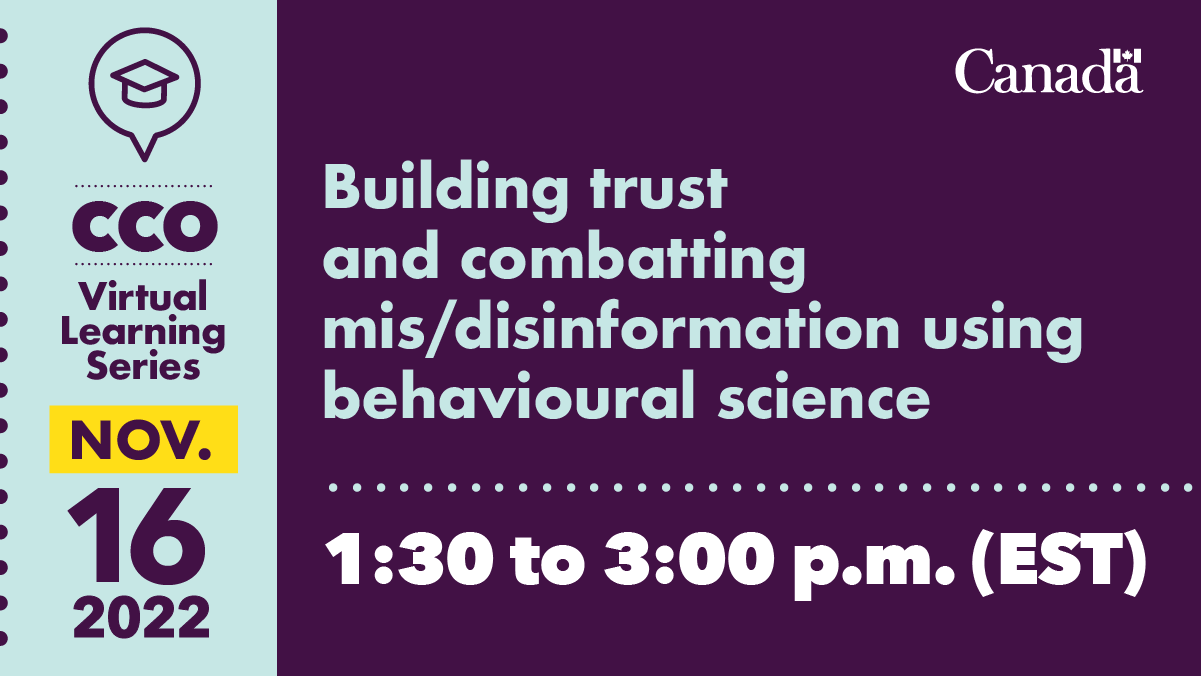
This year, the CCO organized ten Virtual Learning Series, offering regular learning events throughout the year on topics relevant to the community. The goal is to strengthen the communications community network through information sharing and networking. The Virtual Learning Series involves understanding and foreseeing upcoming trends to provide the community with useful information that informs their communications work. In addition, the CCO has seen an opportunity for community building among other communicators across the government since the switch to virtual events.
- Preparing for What Comes Next in Social Media Engagement (in partnership with CSPS) – April 14, 2022
- Insights into Enhanced Web Content Sharing and Workflows on Canada.ca – May 3, 2022
- Communications Evaluation – June 16, 2022
- Storytelling from the Podcaster’s Perspective & AMA on Podcast Production – June 30, 2022
- Evaluating Communications 101 – September 15, 2022
- Planning Virtual Events – September 21, 2022
- Building Trust and Combatting mis/disinformation using Behavioural Science – November 16, 2022
- Marketing Creatively with Relatable Content, Organic Tactics and Partner Engagement – November 23, 2022
- Making Data Accessible to Canadians – December 15, 2022
- Web Personalization and A/B testing – February 1, 2023
Staying connected
Over the course of the year, the CCO issued 12 monthly digital newsletters (accessible only on the Government of Canada network) to keep the community up to date on the latest news and trends. The distribution list now includes more than 4,800 subscribers in the federal public service, most of whom are communications professionals.
The CCO continues to maintain a social media presence, including Twitter and LinkedIn. The CCO also shares information and resources on GCTools (GCconnex and GCpedia) (accessible only on the Government of Canada network) and on the CCO website through our Learning Portal. In 2022-23, the @CCOBCC Twitter account reached over 4,200 followers. The CCO’s new LinkedIn business account grew to over 1,800 connections in the same period.
Key Messengers blog
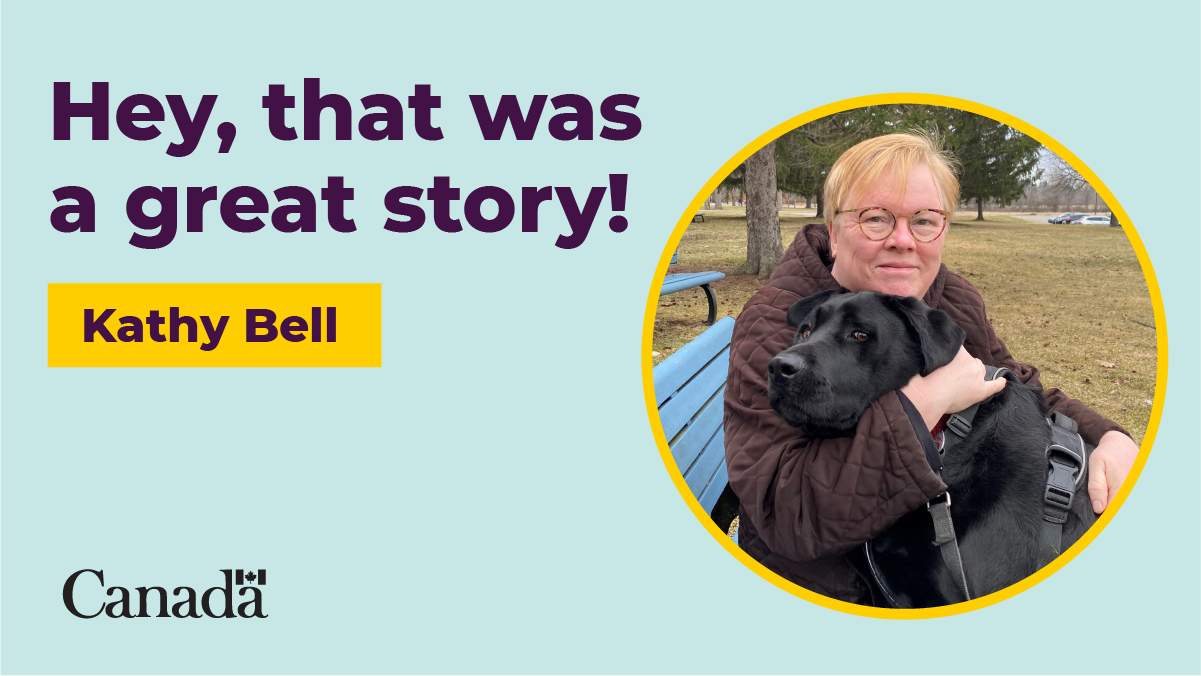
In 2020, the CCO launched a new blog called Key Messengers. This initiative highlights stories from the communications community. Since April 2022, the CCO has published eight new articles sharing best practices and lessons learned across various areas in federal communications:
- Advancing reconciliation through Indigenous-led and co-created content
- Spotlight on you! Recognizing the communications community for National Public Service Week 2022
- Hey, that was a great story!
- Podcasting through the lens of authentic soldier stories
- Communications evaluation – get started with measurable objectives
- 30 Days of Action: An internal communications campaign for the National Day for Truth and Reconciliation
- 2021-22 GC Web Analytics Awards: Recognizing excellence, results and impact
- Top tips on data storytelling from the StatsCAN Plus team
Recruitment and retention
Over the past year, the CCO moved forward on an IS-04 collective staffing process to recruit new communications, marketing, and advertising talent.
An external IS-04 staffing process for communications advisor and advertising/marketing advisor positions launched in March 2022. A pool of 189 qualified candidates from across Canada was made available to the communications community in October 2022. Nearly 20% of qualifying candidates are from one of three groups under the Employment Equity Act, and approximately 40% are from outside the federal public service. To help support this staffing process, the CCO piloted the online recruitment platform, VidCruiter, completing and assessing nearly 300 pre-recorded interviews through this tool.
The CCO also actively manages several other pools at the IS-03, IS-04 and IS‑06 levels, and it keeps an at-level list of communications professionals of all levels and departments from across the country refreshed and current for hiring managers.
To maximize hiring of candidates qualifying in IS processes, the CCO manages a departmental pools list of candidates who have qualified in other departmental staffing processes to share with hiring managers across the public service.
The CCO, working with an interdepartmental working group and the Office of the Chief Human Resources Office at the Treasury Board Secretariat, developed and launched interdepartmental standardized job descriptions (ISJDs). These ISJDs describe work for the IS-02 to IS-06 levels and provide the community with a standardized tool that can bring greater consistency and mobility to the IS community across the public service.
Community development and recognition
The CCO Ambassador group serves as a network and plays a significant role in community building, innovating, and collaborating in the communications community. Many great and informational conversations were had this year. The CCO will continue to host Ambassador and Cross-Canada Communication Advisory Group (CCCAG) meetings. This year, the CCO launched roadshows in September, where we had the chance to connect with other communications teams through our Ambassador network. It provided the CCO with an opportunity to connect with and provide information to other communicators across the government! We did a total of 10 roadshow presentations.
On March 3, the Canada School of Public Service (CSPS) hosted their Government of Canada Innovation Series on innovation in communications strategies. The CCO played a small supporting role by recruiting speakers for this event. Through the CCO’s knowledge of leaders in the communications field and CSPS’ ability to host outstanding and informative events, the event was well received by attendees, which also included PCO’s very own Assistant Secretary to the Cabinet, Laurie-Anne Kempton, on the list of speakers.
Communications Awards of Excellence
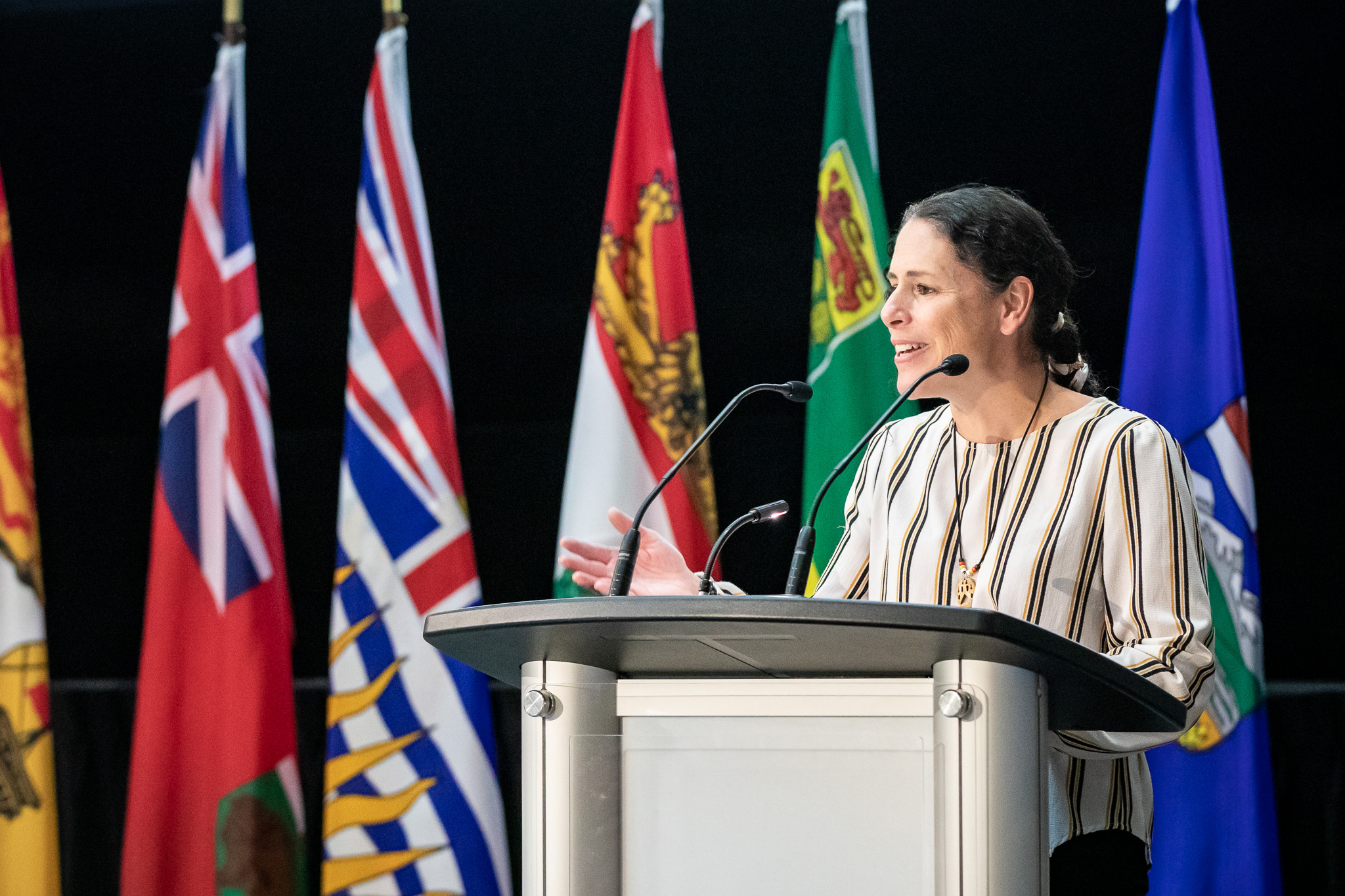
Communications Champion, Valerie Gideon, delivering the opening remarks at the 2023 Communications Awards of Excellence ceremony.
In March 2023, the CCO held a hybrid ceremony to celebrate and announce the winners of the Government of Canada Communications Awards of Excellence 2023. These awards recognize high-impact initiatives, exceptional contributions and best practices in communications in the federal public service. We received 78 nominations from 29 departments and agencies.
This year, we were also pleased to introduce three new award categories to capture the breadth and depth of the work being done by federal communicators.
- The Platinum Award recognizes an outstanding organic or grassroots, low- or no-budget communications project or campaign that really hit the mark.
- The Mosaic Award recognizes leadership in accessible and inclusive communications.
- The Exceptional Leader Award recognizes an individual who has shown leadership and vision as a communicator and a leader and who has demonstrated professionalism, integrity, and strong ethics in their work.
Congratulations to all the nominees, as well as this year’s winners.
- Diamond Award of Communications Excellence: Employment and Social Development Canada – National Skilled Trades campaign
- Platinum Award of Communications Excellence: Canada Border Services Agency – Border Services Officer recruitment campaign
- Golden Alliance Award of Communications Excellence: Indigenous Services Canada – Support for Indigenous communities’ participation in Papal visit 2022
- Lighthouse Award of Communications Excellence: Global Affairs Canada – Countering disinformation
- Insider Award of Communications Excellence: Shared Services Canada – Modernizing our intranet MySSC+
- Regional Powerhouse Award of Communications Excellence: Indigenous Services Canada – Indigenous Services Canada Quebec Region
- Mosaic Award of Communications Excellence: Public Services and Procurement Canada, Canadian Heritage, Women and Gender Equality – Guidelines for Inclusive Writing
- Master Storyteller of the Year Award: Department of National Defence – Kirk Sullivan
- Exceptional Leader Award: Innovation, Science and Economic Development – Eric Joyce
- Rising Star Award: Indigenous Services Canada – Elisha Barry

Photo credits: Eric Laflamme.
The way forward
For the CCO, the year to come undoubtedly holds continued collaboration with the communications community. It will look like listening to diverse voices that will help shape the Government of Canada’s programs and policies, in keeping with the business plan we developed in 2021.
The three-year business plan laid the groundwork for long-term progress and outlines activities to address the challenges the communications community is facing. To facilitate long-term planning, the CCO negotiated multi-year funding agreements with departments and agencies for the period from April 1, 2021, to March 31, 2024. Currently, there are 49 departments and agencies participating in the multi-year funding agreements.
As we enter the third year of the plan, we are looking to collaborate with partners more closely than ever before. For example, we know that communication enables transparent interactions. With mis- and disinformation on the rise, bolstering Canadians’ trust in government is increasingly important. Communicators are in a position to make a significant contribution in countering mis- and disinformation. Together with colleagues in policy and program development, security and intelligence, behavioural science and research, and many other fields, the communications community has a key role to play in combatting these barriers and raising the level of trust in government. We at the CCO will continue to support communicators in this role in each of our priority areas: recruitment and retention, training and learning, supporting diversity and inclusion, and outreach to the community.
The COVID-19 pandemic brought accelerated new ways of thinking, risk taking, and a willingness to adopt new strategies. In a period where we could not work together in person, many of us worked more closely than ever before. For us, the way forward builds on the lessons of the recent past. How can we keep improving? How can we deliver better designed and more accessible products and services? How can we help communicators working in a rapidly changing environment?
Finally, this year we will continue following the business plan for the next three years, ensuring the Government of Canada’s communicators can continue to play their vital role.
CCO numbers at a glance
- Over 6,000 social media connections
- 8 new Key Messengers blog posts
- 12 monthly digital newsletters
- 10 Virtual Learning Series
- 78 nominations from 29 departments and agencies for Communications Award of Excellence
- Best practice for government communications coordination, according to the OECD
- 2 full-fledged communications programs courses developed
- 1 Behavioural Science Hub created on GCPedia
- 6 Interdepartmental standardized job descriptions, from IS-02 to IS-06
- Over 380 communicators from across the country participated in the Mentoring series, combining for over 240 matches
- One external IS-04 staffing process, resulting in a pool of 189 qualified candidates from across Canada, 20% from one of three EDI groups and about 40% from outside the federal public service
- 5 pools at the IS-03, IS-04 and IS-06 levels managed
Annual funding for 2022-23
Funding by departments and agencies
To facilitate long-term planning, the CCO has negotiated multi-year funding agreements with departments and agencies for the period from April 1, 2021, to March 31, 2024. Currently, there are 47 departments and agencies participating in the multi-year funding agreements. The funding formula is based on the number of employees in the Information Services (IS) category at each contributing department and agency.
| Agriculture and Agri-Food Canada | 41,250 |
| Atlantic Canada Opportunities Agency | 22,500 |
| Canada Border Services Agency | 41,250 |
| Canada Economic Development for Quebec Regions (Quebec) | 22,500 |
| Canadian Food Inspection Agency | 41,250 |
| Canada Revenue Agency | 41,250 |
| Canada School of the Public Service | 22,500 |
| Canadian Heritage | 41,250 |
| Canadian Institutes of Health Research | 7,500 |
| Canadian Northern Economic Development Agency | 7,500 |
| Canadian Nuclear Safety Commission | 7,500 |
| Canadian Radio-television and Telecommunications Commission | 22,500 |
| Canadian Space Agency | 22,500 |
| Canadian Security Intelligence Service (CSIS) | 22,500 |
| Communications Security Establishment | 22,500 |
| Correctional Service Canada | 22,500 |
| Elections Canada | 22,500 |
| Employment and Social Development Canada | 41,250 |
| Environment and Climate Change Canada | 41,250 |
| Federal Economic Development Agency for Southern Ontario | 7,500 |
| Finance Canada | 22,500 |
| Fisheries and Oceans Canada | 41,250 |
| Global Affairs | 41,250 |
| Health Canada | 41,250 |
| Immigration, Refugees and Citizenship Canada | 41,250 |
| Impact Assessment Agency of Canada | 7,500 |
| Indigenous Services Canada | 41,250 |
| Infrastructure Canada | 22,500 |
| Innovation, Science and Economic Development Canada | 41,250 |
| Justice Canada | 41,250 |
| Library and Archives Canada | 22,500 |
| National Defence | 41,250 |
| National Security and Intelligence Review Agency | 7,500 |
| Natural Resources Canada | 41,250 |
| Parks Canada | 22,500 |
| Public Safety | 41,250 |
| Public Service Commission of Canada | 22,500 |
| Public Services and Procurement Canada | 41,250 |
| Royal Canadian Mounted Police | 41,250 |
| Shared Services | 41,250 |
| Statistics Canada | 41,250 |
| Transport Canada | 41,250 |
| Transportation Safety Board of Canada | 7,500 |
| Treasury Board of Canada Secretariat | 41,250 |
| Veterans Affairs Canada | 22,500 |
| Western Economic Diversification Canada | 7,500 |
| Women and Gender Equality | 22,500 |
| Total Contributions | 1,368,750 |
Financial results
| Funding received from Communications branches of Government of Canada departments | 1,368,750 |
| Salaries, administration and corporate support | 1,141,058 |
| Translation | 51,467 |
| Impact Canada Behavioural Science Cohort 3 Impact Canada fellows |
150,289 |
| Secretariat support to Government of Canada heads of Communications Annual retreat 2022-23 |
1,563 |
| Community building Government of Canada Communications Awards of Excellence |
18,373 |
| Community building Accessible Communications Community of Practice |
6,000 |
| Total Expenditures | 1,368,750 |
Feedback
We want to hear from you.
Let us know how we can support you better. Send us your ideas for the future.
Email us at info@cco-bcc.gc.ca.

Library and Archives Canada cataloguing in publication
Library and Archives Canada cataloguing in publication
Library and Archives Canada cataloguing in publication
©Privy Council Office (2023)
All rights reserved
All requests for permission to reproduce this document or any part thereof shall be addressed to the Privy Council Office.
Cette publication est également disponible en français :
Rapport annuel 2022-2023 du Bureau de la collectivité des communications
ISSN 2562-5993
Page details
- Date modified:
